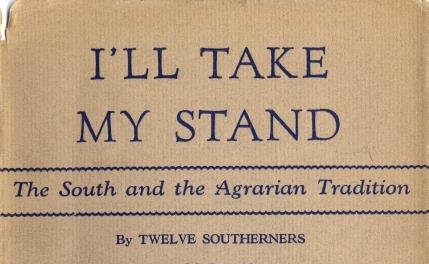In a characteristically thoughtful and well-written piece in yesterday’s The American Culture, Shmuel Ben-Gad describes a classic volume that makes “the case for ‘Antique Conservatism’” The article references a 1930 collection of essays and stories titled “I’ll Take My Stand,” which defend “the South and the Agrarian Tradition” against the aimless, frenetic activity of modern life.
Ben-Gad explains the ideas behind the collection and notes its importance, recognizing its incongruence with contemporary attitudes but noting “it is sometimes good to get a view from another culture, in order to put one’s own in perspective.”
Of course, there is nothing wrong with different perspectives. I’ll Take My Stand presents the ruminations of poets and essayists on the good life, and it’s worth revisiting because it reminds us people of quality such as John Crowe Ransom, Donald Davidson, and Allen Tate used to be public figures in America. Their eloquence puts to shame the emptyheaded mewlings of today’s celebrities (and even our pundits and other public intellectuals).
However, I want to take my own stand against what they were advocating. I read parts of I’ll Take My Stand in a college English class years ago, and it struck me at the time as wrongheaded, wishful thinking. Experience and further reflection have only solidified that view.
It should be recognized that the Southern Agrarians are part of a much-longer debate in the United States about the nature of economic liberty. This debate goes back to the Founders, with Thomas Jefferson and Alexander Hamilton representing the two respective sides. Jefferson wanted agriculture to dominate the economy, because he thought agrarian lifestyles fostered the virtues necessary for a republic. Hamilton, on the other hand, argued commerce, manufacturing, and finance were crucial for the nation’s future.
Jefferson’s views on vocations bear a strong resemblance to Henry Ford’s opinion about his Model T. Ford famously remarked, “Any customer can have a car painted any color he wants, as long as it’s black.” Jefferson apparently believed the common people in a republic can choose any career they like, as long as it’s farming. The Southern Agrarians resoundingly concurred. As Ben-Gad notes, “the book robustly argues for an agrarian way of life in which agriculture and its mode dominate society.”
I find this perspective fundamentally misguided, especially when applied to the American South.
Economic liberty is crucial to a free society. Individuals are extraordinarily diverse, with different talents and interests they wish to pursue. Fewer things undermine human flourishing, creativity, and happiness more than designated elites trying to pigeonhole people into “appropriate” jobs. This is particularly true when those jobs are tied to the land, as agrarian professions inevitably are.
This attitude literally restricts geographic mobility, and it limits social and economic mobility at the same time it constricts human aspiration and broader material opportunity. Real liberty requires economic liberty, which necessarily includes unrestricted choice with respect to vocation and allowing the economy and society to evolve in unanticipated ways in response to the decisions of free individuals.
This, of course, doesn’t mean people shouldn’t choose simpler, agrarian lives if they wish. But experience shows that people generally desire variety, expansiveness, and upward movement as an emblem of achievement. Living in harmony with nature’s rhythms is a minority taste.
There is also the thorny issue of race. Although that issue is not central to the Southern Agrarians’ arguments, it is not credible to hold up rural life in the 1930s South as a social ideal without acknowledging that much of the region’s black population was engaged in sharecropping farming. This arrangement hardly promoted the “free and full flowering of a humanly dignified and happy life” which the authors claimed for Southern Agrarianism.
Sharecropping also cannot be considered an entirely free economic relationship, because blacks in the region generally had few economic alternatives at the time. The authors of I’ll Take My Stand display a highly romanticized view not just of Southern farming but of life in the old South in general.
In contrast, the new South is a remarkable place. Most Southern states are now economically vibrant and dynamic, and they have long been attracting migrants from other regions. At the same time, the South has retained its distinctive warmth, flavor, and culture, which all Americans should cherish. This experience suggests the Southern Agrarians were wrong; the best things about the American South did not depend on remaining rustic, and culture and a sense of localism are both compatible with citizens embracing economic liberty.
This article is part of a Point/Counterpoint series. Read Point: The Case for ‘Antique Conservatism’


